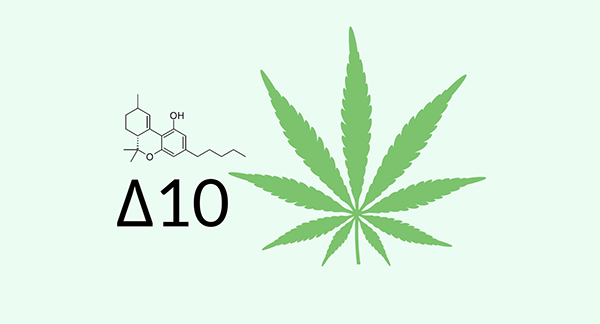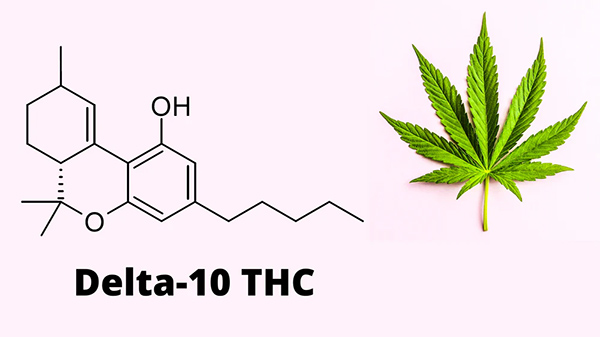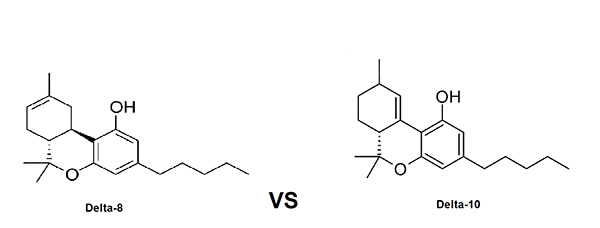Delta 10 THC: How is it created, its benefits, and its risks
Delta 10 THC: How is it created, its benefits, and its risks

The marijuana industry is booming, and expanded legalization means more testing to better understand how the chemical compounds in marijuana, known as cannabinoids, affect the body. Delta 10 THC (Delta-10-Tetrahydrocannabinol) is one of the rarer cannabinoids and is quickly becoming a fashionable alternative for those seeking something new from medical or recreational marijuana. It even helps people get THC experiences in areas where marijuana is not yet legal.
Of all the cannabinoids in cannabis, THC is the most sought after because it gives you the euphoria that people often seek from cannabis. But did you know there is more than one THC?
What we commonly call THC is chemically known as Delta-9 Tetrahydrocannabinol. Delta-10 THC is a relatively rare cannabinoid that is not very potent. It is not even the only other form of Delta for THC.
Delta-10 THC products are increasingly capitalizing on the marijuana boom while providing a legal loophole for areas that still have anti-marijuana laws. How is that possible?
How can you own a marijuana product that gets you high but is still legal in a state where marijuana is illegal? What does it do? Why do people want it?
This article will clearly explain Delta 10 THC, its potential uses, benefits, health risks, and more. How does delta-10 THC stack with traditional cannabis products? How much THC does Delta 10 have? Let's take a look.
What is Delta 10 THC?

Marijuana users know THC is the part of marijuana that can get you high, but they may not know that other types of THC offer different effects or "highs."
Delta 10 THC is an isomer or chemical cousin of standard THC. Isomers are compounds with the same chemical formula but slightly different molecular structures. In short, they are made of the same atoms, but the atoms are organized differently.
Delta-9 (THC) and another isomer, Delta-8 THC, along with cannabidiol (CBD) and cannabinol (CBN), are the four most common of the hundreds of cannabinoids found in weed. Delta-10, on the other hand, is a rarer type.
Cannabinoids interact with the body's endocannabinoid system (ECS). Like the nervous or endocrine systems, the endocannabinoid system regulates many important life processes.
The endocannabinoid system is like a subdivision of the nervous system. It regulates
- eating
- Learning and Memory
- Emotional processing
- Inflammation and immune response
- Temperature control
- Pain control
- Sleep
Each strain of weed can affect you differently because of how these different cannabinoids interact with your body.
You may wonder why there are so many different types of THC. The reason is how THC is created.
How is THC produced?
Before heating, most THC is present in the flowers of cannabis plants as tetrahydrocannabinol acid (THC-A). However, when heated, this non-psychoactive acid (THC-A) becomes the psychoactive THC in a process called decarboxylation.
This heating process also produces delta-8 and delta-10 THC, which are slight variations of ordinary THC. These subtle differences affect how they interact with the body.
What is the difference between Delta-10 and Delta-8?

Chemical bonds separate the two compounds, but these subtle chemical differences significantly change their influence. Delta 10 and Delta 8 THC are psychoactive, so they will make you "high."
The high of Delta 10 THC is lower than that of Delta-9 THC, and they are also different from each other. If you still subscribe to the Indica vs. Sativa model, Delta-8 is like Indica, and Delta 10 THC is like Sativa. However, the potency of Delta 10 THC is lower than that of Delta 9 THC, which makes its potency similar to that of Delta-8 THC.
As we all know, Delta-8 has a stronger sedative effect and has the same "couch lock" potential as the popular Indica strains. Like Delta-9 THC, it interacts with CB1 and CB2 receptors of the endocannabinoid system.
So what effect does Delta-10 do?
Delta-10 THC products are more stimulating and help to improve creativity and cognitive ability. While having stimulating qualities, it can also help relieve stress and boost energy.
Delta-10 and delta-8 THC appear in products that promote these specific cannabinoids because they can provide you with the uplifting high of THC without some of the paranoia associated with edibles or more general cannabis use.
How does Delta-10 affect the body?
Delta-9 and Delta-8 THC activate CB1 receptors in the endocannabinoid system. However, Delta-10 THC does not activate these receptors. This can help avoid the paranoia and anxiety from other THC consumption.
Although it is not as psychoactive or highly inducing as Delta 9 and Delta 8, Delta 10 will help regulate mood. It helps to improve your mood and relax your body. This is partly due to other cannabinoids in many Delta-10 THC products.
Delta-10 is so rare that it is almost impossible to find a product with 100% Delta 10 THC. Therefore, it is often mixed with other cannabinoids, such as cannabinol (CBG) and cannabinoid (CBC).
These compounds can usually increase the onset of action. This is how long the product takes to produce an effect. Given that the cannabis industry is trying to downsize this time, this is why Delta-10 products are not as popular as products like Delta-8 because the latter will get you high faster.
How is Delta-10 THC made?
Although naturally occurring in hemp plants, many Delta-8 and Delta-10 products on the market are manufactured. So, if you are wondering, is Delta-10 THC synthetic? The answer is no.
Delta-8 and Delta-10 THC are produced by chemical methods. They can be created by changing Delta-9 THC to Delta 8 or 10 THC. Another way is to add chemicals (such as hexane) in the cultivating process of Delta-9 THC, which hets more Delta-8 or Delta-10 THC.
A popular method is to cultivate CBD oil from hemp. Then the oil is chemically changed to extract delta-8 or delta-10 THC. This is the universal appeal of these products and how they can skirt legislation. Technically speaking, hemp is legal under the farm bill, so high that one can get from Delta-8 and Delta-10 THC products extracted from legally grown hemp also legal.
Is Delta-10 THC legal?
Delta-10 is federally legal. Reason: Most delta-10 THC in the market is made from hemp. Hemp is legally defined as any cannabis plant with THC (Delta-9) below 0.3%.
The Farm Bill of 2018, officially known as the Agricultural Improvement Act of 2018, removes hemp and hemp seeds from the Drug Enforcement Administration (DEA) list of controlled substances. This also authorizes the production of more hemp-based products.
To save a lot of legal terms, since Delta 10 products are made from CBD oil legally extracted from hemp with less than 0.3% THC, even if the product can get you high, it is legal to buy and consume at a federal level.
Some states have severely cracked down on or wholly banned Delta 10 THC, including:
- Alaska
- Arizona
- Arkansas
- Colorado
- Delaware
- Idaho
- Iowa
- Mississippi
- Montana
- Rhodes
- Utah
Before purchasing any Delta 10 THC products, please make sure that you have checked their legality in your state. Remember, since these products are federally legal, they can be mailed, but only to the states where the products are legal.
Will using Delta-10 THC make you fail a drug test?
Although Delta 10 THC is legal, it may prevent you from passing a drug test. Drug testing technology may have been advanced, but it can't tell one type of THC apart from another, and as Delta 10 THC is still THC, you won't pass any test looking for that.
So how long does Delta-10 THC stay in your system?
Depending on how your body metabolizes, Delta-10 may remain in your system for two days or even a few weeks. Please keep this in mind when using Delta 10 THC products, as they will lead to positive drug tests.
Is Delta-10 THC dangerous?
Delta 10 THC is inherently dangerous only when you are allergic. The "High" is also quite subtle, not as strong as Delta-8 or standard THC, so you are unlikely to have adverse reactions.
However, there is a potential danger due to the use of many toxic chemicals such as hexane in the whole extraction process. Many of these products are not necessarily dangerous because hexane is also used to cultivate other edible essential oils, but it may cause concern.
You will want to ensure adequate testing because some unethical producers may try to join the cannabis trend to get cash without caring how they can get Delta-10. A proper testing laboratory can ensure that there are no traces of toxic elements in the products. After all, Delta-10 THC was accidentally discovered after cannabis plants were exposed to chemicals. It could be fake if you see a product that is 100% or even a very high percentage of Delta 10 THC. Because the production of Delta 10 is fairly hard and the amounts in hemp are relatively small, Delta-10 is most commonly mixed and sold in other cannabinoid products.
What are the side effects of Delta-10 THC
As Delta-10 is significantly milder than Delta 9, the side effects reported include mild dry mouth, lethargy, increased appetite, red eyes, and increased mental activity. The body has better tolerance to it, and users report almost no Delta-10 THC side effects. To be safe, ensure you get high-quality products from authentic suppliers.
Conclusion
Delta-10 THC and delta-8 THC seem to come out of nowhere.
The main reason they have seen such growth is that they can circumvent the law and allow people in states where cannabis consumption isn't yet legal to experience a similar high.
As a compound found in trace amounts of cannabis, Delta 10 provides a more subtle high. It won't get you blazed as Delta-9 can.
It is safe to use, energizes you, and reduces your anxiety and depression.
It could be that more states will move to prevent the loophole that makes Delta-10 and Delta-8 legal. It could also be that the US legalizes cannabis at a federal level, and many may not bother with these legal THCs as they are harder to produce. Until then, you can enjoy a high experience even if cannabis isn't legal in your state. That is, as long as Delta 10 is stall legal where you live.
